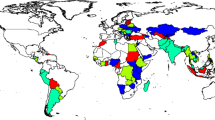Abstract
While it is widely believed that bribery is ubiquitous among Asian firms, few studies have offered systematic evidence of such activities, and the dynamics of bribery in Asian firms have not been well understood. The research reported here used World Business Environment Survey data to examine some distinct characteristics of bribery in Asian firms and to empirically test 10 hypotheses on determinants of bribery. We find that firm characteristics such as firm size, growth rate, and corporate governance are important determinants of bribery activities at the firm level, and that Asian firms are more likely to bribe when faced with fierce market competition, corrupted court systems, convoluted licensing requirements, nontransparent interpretation of laws and regulations, inefficient government service delivery, and high taxes.
Similar content being viewed by others
References
Ades, A. and R. Di Tella: 1999, ‹Rents, Competition and Corruption’, American Economic Review 89(4), 982–993
Argandona, A.: 2005, ‘Corruption and companies: The use of facilitating payments,’ Journal of business ethics 60(33), 251-264. doi:10.1007/s10551-005-0133-4
Arvis, J.-F. and R. Berenbeim: 2003, Fighting Corruption in East Asia: Solutions from the Private Sector (The World Bank, Washington DC)
Asher, M. G.: 2001, ‹Design of Tax Systems and Corruption’, Paper presented in a Conference on ‘Fighting Corruption: Common Challenges and Shared Experiences’, Singapore, 10–11 May
Bourguignon, F.: 2003, ‘The Growth Elasticity of Poverty Reduction: Explaining Heterogeneity Across Countries and Time Periods’, Inequality and Growth: Theory and Policy Implications
Chen, S. and Y. Wang: 2001, ‘China’s Growth and Poverty Reduction: Recent Trends between 1990 and 1999’, World Bank Policy Research Working Paper 2651
Clarke, G. and L. C. Xu: 2004, ‘Privatization, Competition and Corruption: How Characteristics of Bribe Takers and Payers Affect Bribe Payments to Utilities’, Journal of Public Economics 88 (9-10), 2067-2097. doi:10.1016/j.jpubeco.2003.07.002
Devarajan, S. and I. Nabi: 2006, Economic Growth in South Asia: Promising, Un-Equalizing, …Sustainable? (The World Bank, South Asia Region)
Gaviria, A.: 2002, ‘Assessing the effects of corruption and crime on firm performance: evidence from Latin America,’ Emerging Markets Review 3(3), 245-268. doi:10.1016/S1566-0141(02)00024-9
Habib, M. and L. Zurawicki: 2002, ‘Corruption and Foreign Direct Investment,’ Journal of International Business Studies 33(2), 291-307. doi:10.1057/palgrave.jibs.8491017
Herrera, A. M. and P. Rodriguez: 2003. ‘Bribery and the Nature of Corruption’, Working Paper, Department of Economics, Michigan State University, MI
Kaufmann, D.: 1997, ‘Corruption: Some Myths and Facts’, Foreign Policy, Summer, 114–131
Kimbro, M. B.: 2002, ‘A Cross-country Empirical Investigation of Corruption and its Relationship to Economic, Cultural and Institutional Variables: An Examination of the Role of Accounting and Financial Statements Quality’, Journal of Accounting Auditing and Finance 17(4), 325-349
Kraar, L.: 1995, ‘How Corrupt is Asia?’, Fortune 132(4), 18
Lau, L. J. and J.-S. Park: 2003, ‘The Sources of East Asian Economic Growth Revisited’, Working Paper, Department of Economics, Stanford University, Stanford, CA
Lee, S. H., and K. K. Oh.: 2007, ‘Corruption in Asia: Pervasiveness and arbitrariness,’ Asia Pacific Journal of Management 24(1), 97-114. doi:10.1007/s10490-006-9027-y
Mauro P.: 1995, ‘Corruption and growth’, The Quarterly Journal of Economics 110(3), 681-712
Myrdal, G.: 1968, Asian Drama: An Inquiry into the Poverty of Nations (Pantheon Books, New York)
Palda, K. F.: 2001, Tax Evasion and Firm Survival in Competitive Markets (Edward Elgar Publishing, London)
Powpaka, S.: 2002, ‘Factors Affecting Manager’s Decision to Bribe: An Empirical Investigation’, Journal of Business Ethics 40(3), 227-246
Ravallion, M.: 2004, Pro-Poor Growth: A Primer (World Bank, Development Research Group, Poverty Team)
Rose-Ackerman, S.: 1996, The Political Economy of Corruption – Causes and Consequences, Note No. 74, Public Policy for the Private Sector, The World Bank
Rose-Ackerman, S.: 2002, ‘Grand’ Corruption and the Ethics of Global Business’, Journal of Banking and Finance 26(9),1889-1918
Sanyal, R.: 2005, ‘Determinants of Bribery in International Business: The Cultural and Economic Factors’, Journal of Business Ethics, 59(1-2), pp. 139-145
Svensson, J.: 2003, ‘Who must pay bribes and how much? Evidence from a cross-section of firms’, The Quarterly Journal of Economics 118(1), 207-230
Treisman, D.: 2000, ‘The Causes of Corruption: A Cross-National Study’, Journal of Public Economics 76(3), 399-457
Wei, S.-J.: 2000, ‘How Taxing is Corruption on International Investors?’, Review of Economics and Statistics 82(1), 1-11
Wu, X.: 2005a, ‘Corporate Governance and Corruption: A Cross-Country Analysis’, Governance: An International Journal of Policy, Administration and Institutions 18 (2), 151-170
Wu, X.: 2005b, ‘Political Institutions and Corporate Governance Reform in Southeast Asia’, in K. L. Ho (eds.), Reforming Corporate Governance in Southeast Asia: Economics, Politics and Regulation, (ISEAS, Singapore)
Author information
Authors and Affiliations
Corresponding author
Rights and permissions
About this article
Cite this article
Wu, X. Determinants of Bribery in Asian Firms: Evidence from the World Business Environment Survey. J Bus Ethics 87, 75–88 (2009). https://doi.org/10.1007/s10551-008-9871-4
Received:
Accepted:
Published:
Issue Date:
DOI: https://doi.org/10.1007/s10551-008-9871-4




